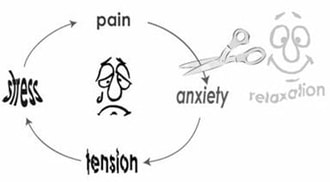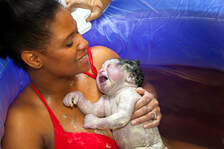|
“If only I knew then what I know now – how different it all might have been.... Most of us have had times in our lives that cause this phrase to resonate around in our heads causing a plethora of feelings, occasionally positive but more often negative: inadequacy; regret sorrow; sadness. I wonder for many women if this rings most true with their experience of childbirth. I know it does for me. In many ways society sets us up to expect childbirth to be horrifically painful and of a woman not being able to cope. We are bombarded with images in the media of childbirth being a medical event involving much screaming, shouting, panic and above all a painful experience that requires drugs to take the pain away. Then to top it all friends, family and sometimes complete strangers are desperate to impart their bad birth experiences to you as soon as they know you are pregnant. To hear the “gentle birth” stories - the stories where babies are born peacefully in an atmosphere of calm and where the power of childbirth is embraced you need to be inquisitive. You need to actively seek them out. Many of us only search out these “gentle birth” stories second time around when the “if only” echoing in our minds drives us to understand better and take control. What do I know now? What’s my “if only”?It is that the "pain" of labour is a normal side-effect of a natural process. The pain is simply the consequence of a woman’s body working hard and a sensation that tells you all is going well – whereas in most other contexts of our lives pain is seen as negative and treatable with a variety of drugs and interventions. By understanding the physiology of labour and the intricate interplay between you, your baby and your hormones helps to break the “fear - pain cycle” and allows you to work with the pain, decreasing fear and making the sensations of childbirth more bearable and labour more efficient and shorter. the "pain" of labour is a normal side-effect of a natural process
So, what is available to help you take control of your labour and minimise the chances of an “if only” birth experience? The good news is there are many things you can do do take control of your labour AND they are simple, logical, easy to master and involve: continuous emotional support, movement and position, labouring in water, breathing techniques, relaxation, massage, TENS. Couple these techniques with knowledge and information, you have a powerful alliance, enabling you to make informed decisions and be in control of your birth experience. SupportResearch has shown that it's important for women in labour to have emotional support. This means encouragement, reassurance, a trusted person to listen to you and just be there. For most women this would be their partner, for others it will be a friend or close family member. Making sure that you have the right person to support you will help you cope with the pain and discomfort of labour more easily. Studies (Cochrane 2017) have shown that with continuous birth support you are:
Continuous support could be provided by an independent midwife, doula or in Belgium a physiotherapist. Position and MovementGravity is your friend! It is a powerful force, so don't fight it. Staying upright keeps labour hormones flowing and gives your baby maximum room to manoeuvre. Movement – walking, swaying – also lends labour a helping hand. Being upright and mobile maximises your body’s ability to give birth and there are no downsides you are doing what comes naturally. Breathing and Relaxation Breathing and relaxation techniques are fantastic at reducing stress and helping you stay calm. They relieve tension in muscles and make sure oxygen is channelled to your hard working uterus and baby. Breathing techniques used during contractions can provide a focus that reduces the sensation of pain. Massage Massage releases tension and provides reassurance and comfort while at the same time encouraging the flow of birth hormones. It is non-invasive, can be started and stopped easily and involves your partner in your labour. WaterMost hospitals are able to offer you the chance to labour in water and it is possible if you choose to have a home birth. Water soothes pain and, in a large birthing pool, supports you, enabling you to glide into any position. A hot shower on your back or a warm bath at home can help too. Women who labour in water need fewer interventions and are less likely to need other drugs. It is a drug-free option and works well but sometimes it can slow down labour, particularly if you get in too early. You also need to make sure the water feels warm but not hot. Having an epidural or using a TENS are not possible in water. If you would like to actually go on to birth you baby in water you need to discuss it with your caregivers - gynaecologist or independent midwife and see if it is an option they are able to support. TENS (Transcutaneous Electrical Nerve Stimulation)A TENS machine is a small battery operated device that transmits mild electrical impulses to pads on your back The electrical pulses are thought to stimulate nerve pathways in the spinal cord which block the transmission of pain messages to your brain. On the plus side TENS can act as a distraction, with many women finding it effective in early labour, what’s more you are in control. You can move about freely and you may use the TENS at home, keeping it on when you go into hospital. There is some evidence that women using TENS are less likely to rate their pain as severe and women cope better with contractions. The downsides are that you will need your partner to help you place the pads on your back using it in water is a no and some may find the sensation irritating. Also you may need to remove the TENS if you have a CTG (cardiotocograph – a form of electronic monitoring of your baby). But, it is non-invasive and has no side effects for you or your baby. TENS machines are available to hire from the BCT. How do hypnobirthing techniques help break the fear-pain-tension cycle? Hypnobirthing is a powerful combination of all of the above. It is so much more than just a few relaxation and breathing techniques. Lots of simple, little things (you can't be doing complicated things when you are giving birth) and then practicing them. The more you practice how to quieten your mind and relax the more deeply relaxed you become and the easier it is to relax. So, you practice, practice, practice! When it comes to your baby's birthday you will be able to access the hypnobirthing tool box take out the right technique for you and use it with skill and understanding. Within a KG Hypnobirthing Course, we create space for you to release any fear you have accumulated about childbirth (breaking the fear-pain-tension cycle) and building confidence in your body to birth your baby. Hypnobirthing encompasses:
At the end of the day every labour is different and you should be able to choose whatever you need to help you work with the pain of labour. Give yourself a chance of avoiding the “if only” by:
KGH gives you the tools to achieve the best birth for you! Kate EllwoodMother, Wife, Hypnobirthing Teacher, First Aid Instructor and so much more... 
0 Comments
Being an ex-pat can be lonely and overwhelming. Throw a new baby into the mix and those feelings are magnified 100 fold. I would have been lost without the BCT when we arrived in Belgium with a 3 month old baby and a stroppy teenager. For my family it provided a space to build a 'family' of friends who have shared our ex-pat journey through thick and thin over the last 16 years. It is a fabulous organization.
It is my pleasure to offer my KG Hypnobirthing Group Courses through the BCT. It means new mum's and their partners are immediately linked into a network of kind and supportive fellow ex-pats as they settle into family life away from their family and friends back home. If you would like to get a sneaky peak of the Brussels Childbirth Trust's new home 'The Clubhouse' in Ixelles, Brussels then check out their website and watch the new video from BRUZZ fb.watch/cO29JCKABm/ Giving yourself permission to relax and nurture yourself and your baby is not a luxury! Sharing hints and tips to manage the postnatal period What are your pyjamas like, a bit tatty, out of shape, grey from the wash with elastic showing the strain? Uhm time to buy a new pair I think........... We all have days when if we listened to what our bodies were telling us and we went along with how we truly felt we would end up spending a quiet day on the sofa in our pyjamas (PJ's) nibbling on treats, dozing and taking time out to recharge our batteries and who would want to do that in tatty PJ’s? But, we don’t listen to our inner voice and take a pyjama day, do we? We battle on regardless and often pay the price with illness maybe physical or mental and for new mum's that means postnatal depression. Never are PJ days more important than in the weeks after your baby’s born, a time to nurture and be nurtured as you bond with your baby, adjust to motherhood and establish breastfeeding. It is a time for your body to heal, a time to wear your PJ’s as a uniform that gives a subliminal message to others - you are not ready to engage in the real world. You are absorbed in caring for your baby and need to be looked after. In the Western world we seem to have lost sight of this and there is enormous pressure to get back into our skinny jeans, look like a film star at the Oscars and behave like a superhero as soon as possible after birth - setting us up to struggle. In many areas of the world this concept of rest and nurturing a woman after childbirth is written into their customs and rituals but this is certainly not the case everywhere! Taking time out for PJ days and just being with your baby has important benefits for you with your baby, by not being distracted by outside stimuli or exposed to too many germs and benefits for you that include protection against postpartum depression and easier physical recovery. According to Karen Kleiman the period after birth is a time when you are most vulnerable to emotional illness. Failure to take care of yourself adequately can create the perfect opportunity for a serious depression to set in. No one likes to think about that. But the truth is mothers don't spend enough time thinking about how they feel. Understandably, most of your spare energy goes toward caring for your baby. But, the facts are clear, if you take care of yourself, you will strengthen the resources that will enable you to take better care of your baby. The benefits for breastfeeding of having a prolonged period of PJ days after birth are tangible with enhanced breast milk production. Nancy Mohrbacher, an international board – certified lactation consultant, says it is very intense to care for a newborn in the first forty days. Your baby is feeding around 8-12 times a day with feeds taking as long 40 minutes and those are not evenly spread over a 24 hour period but in clusters, when you are literally routed to the spot feeding your baby for what seems like hours. There’s not much time for anything else. Giving in to this process and feeding on demand in a relaxed and nurturing environment is essential as it helps establish your milk supply. It’s a simple case of supply and demand. The amount of new milk created depends on how much has been taken out. It takes about 6 weeks for Mum and baby to get the hang of breastfeeding, slowly feeling more co-ordinated and getting easier and faster. Ok, so in the crazy, mixed up world we live in, often away from our close family forty days in pyjamas recuperating and resting confined to the house is for most of us unrealistic, more's the pity. But, with planning and organisation before your baby is born and working as team with your partner you can manage to create that vital breathing space as you adjust to motherhood. So, here are a few things to bear in mind: 1. Visitors (and in ex-pat land they come and stay for weeks being both a blessing and a curse) should be kept to a minimum. The permitted few should bring a cool bag full of meals for the family – or, even better, take any older children out for a few hours. When someone asks what they can do to help — tell them. This is no time to be a martyr or to suffer in silence. If someone in your family or a friend has offered to assist you in some way, don't be afraid to tell them exactly what you would like them to do. Remember: NO ONE comes to visit without leaving you in a better state than when they arrived, at the very least, bringing cake and making the tea 2. Nurture yourself It's really true. It can feel wonderful if you pamper yourself a little. Whatever it takes, manicure, pizza, long-distance phone call, hair-cut, a good book..... You will never find a better excuse to indulge in self-absorbed and perhaps, frivolous projects. (Remember, if you feel guilty about this, you will be defeating the purpose.) So, enjoy and go for it! 3. Sleep If your baby is getting you up at night, it is especially important for you to find time to rest during the day. That means, when your baby naps, you do not do the laundry or clean the floor. It means, you rest! If you can't sleep, then lie down on the couch, close your eyes and try to relax. Your body needs time to recharge.  4. Eat nutritiously Eating well is one of the best ways to fortify your resources. Skinny jeans can wait. This is especially important if you are breastfeeding. Don't forget to watch out for excessive amounts of high-sugar snacks and caffeine. Both can cause you to feel jittery and anxious. 5. Exercise moderately Try to get out and walk if you are not interested in regular aerobic activity. The fresh air will feel wonderful and the exercise will help keep you in shape and feeling good. 6. Stay in touch with friends Spend time with family and friends that you feel most comfortable with. Try to maximize the time you spend with people who will support you and help you out, if necessary. Isolation can increase feelings of loneliness and depression — try to stay connected with important relationships. 7. Try not to pressure yourself thinking that everything has to be done right now. Unfortunately, if you are used to getting things accomplished and prefer to be in control at all times (and who doesn't!), then this may prove to be particularly difficult for you. If procrastinating is just not your style, you may have to learn to let go a little bit and realize that some of the things that you want to take care of NOW, are just going to have to wait. 8. Learn how to say "no" Setting limits is not an easy thing to do. But this is not the time to do favours for other people or for others to take advantage of how accommodating you may be. You may find it necessary to say, "I would love to help you out, but today is not a good day for that” or “Yes I would love you to come over and see the baby but I'm really tired today. Maybe we can make plans for another time."  9. Simplify everything Laundry can wait. Your bed doesn't have to be made every day. Take-out dinner is fine. Everything doesn't have to be 100% perfect right now. Try to let go of your expectations that everything be exactly the way it was before the baby. It's not. Giving yourself permission to relax and nurture yourself and your baby is not a luxury. It is vital to your well-being and you may be surprised at how wonderful it feels! So, go on treat yourself buy a new pair of PJ’s, make them the most beautiful you can afford and wear them with pride as you undertake the most important job in the world, nurturing a new life, everything else can wait. Further Reading: “What should I expect in the first 40 days of breastfeeding?” Nancy Mohrbacher: www.youtube.com/watch?v=3pDRJ-29EGQ Nancy Mohrbacher and Kathleen Kendall-Tackett (2010) "Breastfeeding Made Simple Seven Natural Laws for Nursing Mothers" New Harbinger Publications Inc “Taking Care of Mom after the Baby Comes” Karen Kleiman www.firstbabymall.com/expecting/parenting/mothercare.htm Kate EllwoodMother, Wife, Hypnobirthing Teacher, First Aid Instructor and so much more...
|
Kate EllwoodKG Accredited Hypnobirthing Teacher Archives
February 2024
|








